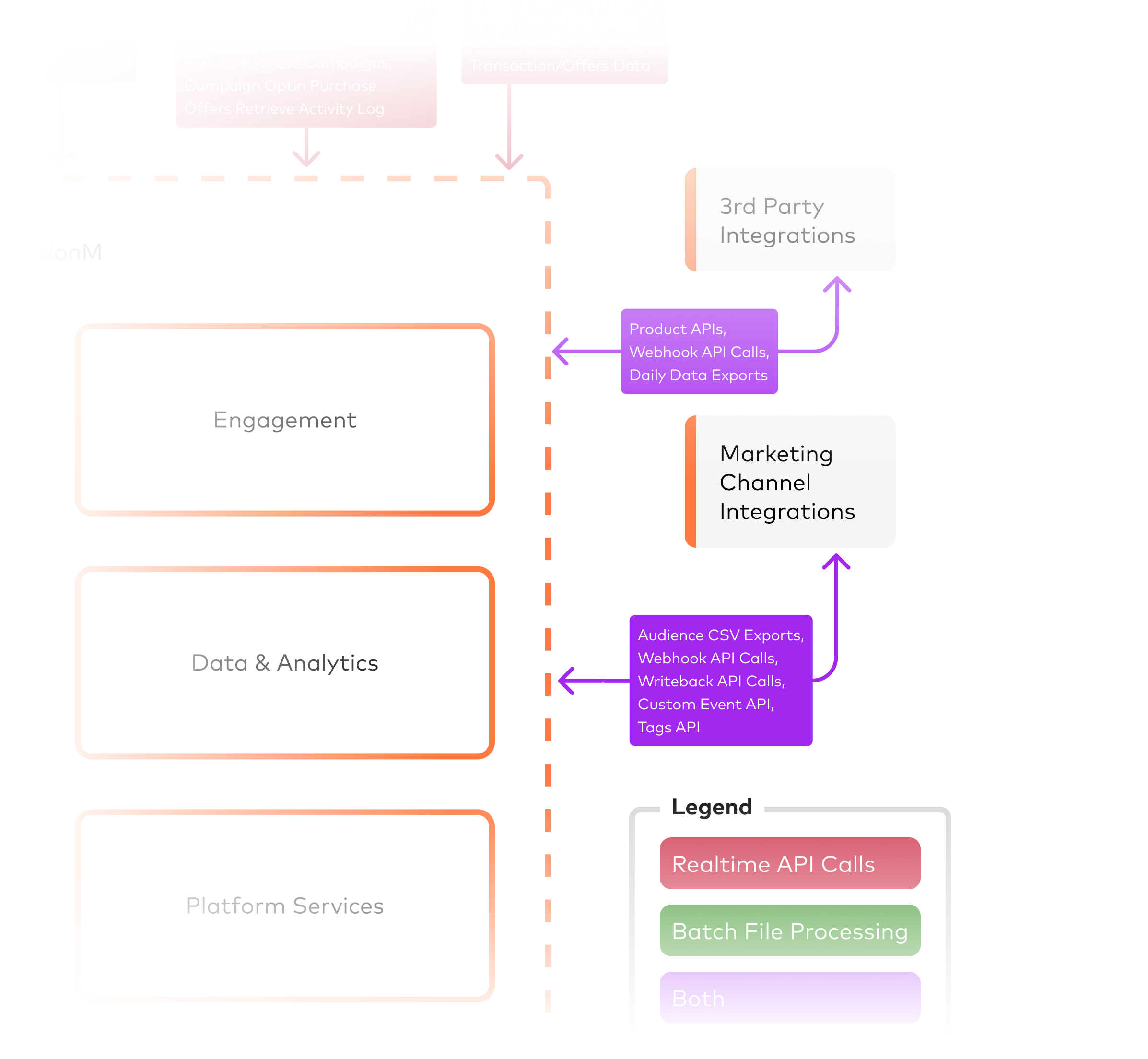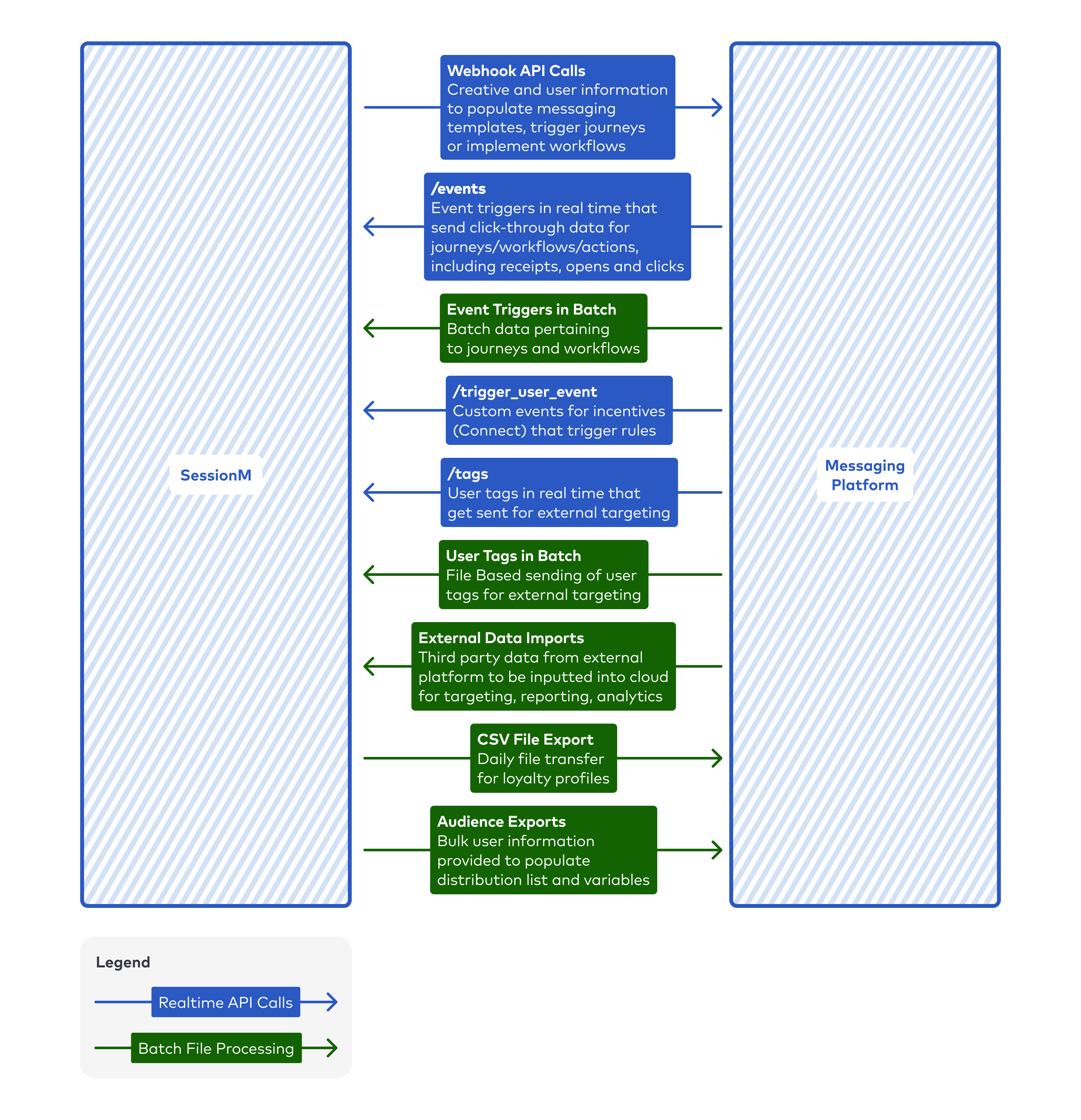Marketing Channel Integration
Marketing channels are the conduits between a brand and its customers. They provide a kind of infrastructure to engage customers with personalized experiences and messages that can compel something more than just clicks or purchases; marketing channels can forge relationships. Often implemented in campaigns designed to message and reward customers for engaging in specific behaviors, marketing channels are only as effective as the data they use to target customer segments and personalize the engagements that follow. SessionM is the engine that generates this data.
This SessionM data derives from two key aspects of any customer: personal information and activities (both transactional and non-transactional). Personal information is typically basic demographic attributes such as name, phone, and email address. However, it can also include issued offers or tags. Activities can include whatever actions a customer took, such as purchases, clicks, opens, or unsubscribes, many of which are expressed as events.
Customer information and the events that signify customer actions are all part of the outbound communication SessionM conveys to partnered marketing channels. The data being sent can be organized into a few integration patterns:
-
Events that represent specific actions or activities customers took. They can include custom events based on non-transactional activities customers undertook via external systems.
-
Tags generated by external segmentation systems that identify customers as members of audience segments, which can be used to further marketing efforts later.
-
Flexible messaging webhooks triggered when customers perform specific actions. Messages types can include email and SMS/MMS, as well as posts on mobile, social, or web platforms. The inputs from SessionM can be used by messaging channels to design, create and automate the production of email messages.
-
Imports (dumps) of event trigger, tag, and third-party data that can power customer journeys and workflows.
-
Exports of customer profile and audience data that expedite future loyalty opportunities.
The integration under discussion in this topic is highlighted in the image below.

A marketing channel integration relies on an accurate record of a customer's personal information and activities. The following core tasks are critical when implementing marketing channel use cases with SessionM:
- Batch imports of data from event triggers, tags and third-party platforms.
- Batch exports of profile and audience data in CSV files to a messaging platform.
- Webhook API calls from SessionM that enable messaging, journeys and workflows on the messaging platform.
- Events API calls for custom events associated with incentives sent from a messaging platform; in such cases, partners or clients are notifying SessionM that the events occurred.
- Tags API calls that send tags to SessionM, where promotional campaigns can be constructed to target specific audience segments.
Key Integration Processes
While this topic does focus on the standard aspects of a marketing channel integration, each implementation can contain specific transaction data points specific to business, or vertical, needs.
The diagram below depicts the key endpoints enabling a marketing channel integration:
You can access technical details for each of the endpoints featured in this graphic using the links below:
-
Endpoint that specifies /events in its path
-
Endpoint that specifies /trigger_user_event in its path
-
Endpoint that specifies /tags in its path
The three API endpoints shown above support marketing channel data that is defined by both events and tags, and is sent from a messaging platform to SessionM. However, many of the green arrows in the diagram - flowing in both directions - represent the import of data into SessionM or the export of data out of SessionM. More specifically:
-
Imports occur when an external messaging platform updates an event, user tag or third-party data in SessionM. These imports contain:
-
Batch files of journey and workflow data.
-
Batch files of tag data to be used for external targeting.
-
External data destined for SessionM to be used for targeting, reporting and analytics.
-
-
Exports occur when SessionM updates loyalty profiles or audiences maintained on a messaging platform. These exports contain:
-
CSV files informing loyalty profiles.
-
Bulk user information for audiences.
-
Also of note in the diagram above is the blue arrow depicting Webhook API calls from SessionM to a messaging platform. These calls enable messaging, journeys and workflows with creative content and user information. SessionM offers very flexible outbound webhooks that can integrate with any system as long as it has published API specifications.
Integration Best Practices
As you move forward with your integration, bear in mind several best practices that can help ensure a successful SessionM implementation.
-
Avoid throttling tag and event data.
-
When sending data in bulk, consider sending tag and event data via flat files.
-
Bear in mind that SessionM API routes are designed for ongoing, real-time activity (what people did).
-
When pushing large numbers of events or tags at one time, do so in batch, via flat file; don't use API endpoints.
-
Endpoints are designed for real-time integrations; not for batch file ingestion. If you want to get data ingested in bulk, use batch file pattern.